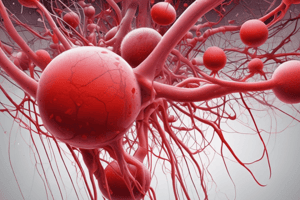Podcast
Questions and Answers
How does the cardiovascular system maintain homeostasis?
How does the cardiovascular system maintain homeostasis?
By continually redirecting blood flow to the tissues as they become more active.
How does the cardiovascular system work?
How does the cardiovascular system work?
It carries blood away from and towards the heart, delivering oxygen, nutrients, and hormones to cells, and removing waste products.
What happens if the cardiovascular system stops working?
What happens if the cardiovascular system stops working?
Heart failure occurs, meaning the heart is not pumping blood as efficiently as it should.
What can heart failure lead to?
What can heart failure lead to?
The heart is the main important part of the cardiovascular system.
The heart is the main important part of the cardiovascular system.
What is the function of the cardiovascular system?
What is the function of the cardiovascular system?
Why is the cardiovascular system important?
Why is the cardiovascular system important?
How does the cardiovascular system regulate temperature?
How does the cardiovascular system regulate temperature?
How is the cardiovascular system connected to other systems?
How is the cardiovascular system connected to other systems?
How do the cardiovascular system and the nervous system work together?
How do the cardiovascular system and the nervous system work together?
Flashcards are hidden until you start studying
Study Notes
Cardiovascular System Overview
- Maintains homeostasis by continually redirecting blood flow to active tissues.
- Key organs include the heart, blood vessels, arteries, and veins.
Functioning of the Cardiovascular System
- Blood vessels transport blood to and from the heart; arteries move blood away while veins return it.
- The system delivers oxygen, nutrients, and hormones to cells, and removes waste products like carbon dioxide.
Consequences of System Failure
- Heart failure occurs when the heart cannot pump blood efficiently.
- Symptoms of heart failure include fatigue, shortness of breath, and difficulty in performing everyday activities.
Importance of the Heart
- The heart is the central organ of the cardiovascular system, serving as a muscular pump for blood circulation.
- Functions primarily to ensure oxygen and nutrient transport throughout the body.
Cardiovascular System Functions
- Essential for transporting oxygen, nutrients, and metabolic byproducts.
- Plays a crucial role in adapting to physical activity, exercise, and stress conditions.
Regulation of Body Temperature
- Blood circulation helps regulate body temperature by distributing heat.
Interconnection with Other Body Systems
- Works closely with the respiratory system to provide oxygen and remove carbon dioxide from the body.
- Ensures nutrient supply and waste removal, integrating with other physiological systems.
Interaction with the Nervous System
- Provides the brain with a continuous supply of oxygen-rich blood.
- The brain regulates heart rate and blood pressure, facilitating coordination between both systems.
Studying That Suits You
Use AI to generate personalized quizzes and flashcards to suit your learning preferences.




